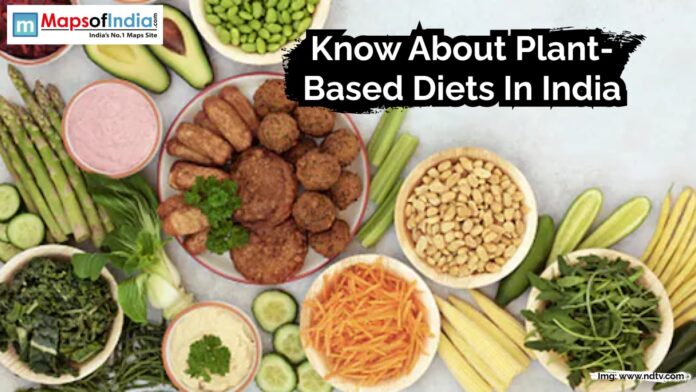Plant-centric food is the foundation of many vegetarian ethnic Indian cuisines. However, the growing veganism is redefining the concept of the country. More Indians are becoming entirely plant-eating as they understand health, environmental challenges, and animal welfare changes.
Veganism in Indian Restaurants and Companies
From the classic dals and subzone to the extremely modern and creative vegan butter chicken, there has never been a moment when vegans and vegetarians had such a varied market. Veganism is changing in Indian menus when new vegan dishes come out on restaurant menus.
Moreover, many businesses are including this shift. Many locations nowadays claim to be vegan and provide areas specifically for those who follow this way of life or eat only plant-based meals. This mindset shift seeks not just for those who want to do good but also for those who like food and favour sensible choices. Many food brands launching a veganism campaign have brought veganism to light as a wonderful mirror of a dynamic transformation in the Indian gourmet landscape.
Milk against Mylo: The Dairy Trend Turns Around
While the traditional opinions on milk remain controversial, the use of dairy substitutes has been progressively increasing in India. Thanks to a better understanding of linked health and environmental concerns, urbanites’ demand for milk from almonds, oats, and coconuts has grown.
A range of plant-based milk is specifically designed to meet the requirements of vegans and lactose-intolerant people. This draws people in as businesses develop unique flavours and boost Mulk’s nutrition, reflecting a broad acceptance of plant-based meals in Indian society. This trend demonstrates changing cultural hormonal status as much as food consumption modification.
Desi Veganism: Cultural Influences
Among the numerous civilisations defining the fundamental heart of the people in India is Indigenous vegetarianism. Just two of the plant-based foods used in Indian cuisine are lentil curries and vegetable biryani; others abound. Nowadays, becoming a vegan requires less effort, as alternative products provide an outlet with almost the same taste as the ones you know.
Attending different cultural events allows attendees to engage in plant-based meals that emphasise local food and ingredients. Such cultural cooking methods systematise classic recipes that harmonise with modern dietary patterns while preserving the nutritional ingredients, minimal environmental impact, and healthy sustenance from which they arose. Turn your attention to good living.
Difficulties and the Door to Opportunity
The introduction of vegetarian diets in India causes problems largely related to the use of different items and the society’s opposite point of view. People discover that their favourite foods are meat and dairy; hence, becoming totally vegetarian is challenging.
On the other hand, being a barrier creates opportunities for creative and innovative energies to flow. The growing number of vegan diets offers companies a chance to draw in vegans with plant-based solutions. Formed for intrapreneurs, many more new food startups are emphasising dairy product substitutes and other proteins.
Athletes Powered by Plants and Global Dietary Change
New performance criteria are being set as vegetarians take the front stage. Bodybuilders and runners have changed their diets and are finding advantages among the top and most fiercely competitive performing sports.
Veganism and sustainability take the stage as the sun sets on the world’s horizon. Plant-based diets abound not just in nutrition but also in many sports worldwide as a result of the tidal surge of individuals trying to live better lives. The sportsmen inspire others to find the advantages of a plant-based diet.
The logical arguments explaining individuals in India’s decision to follow vegetarian diets are as follows: Many Indians are choosing plant-based meals because of their great health advantages. The pyramid blocks of the changing diet are foods heavy in nutrients, such as fruits, vegetables, legumes, and whole grains.
Additionally, ethical points of view drive changes in the direction of veganism. A growing market for substitutes for animal and dairy goods results from sound animal welfare and environmental sustainability being key issues of concern. People all around are changing their diets; this is a result of the knowledge that is progressively finding its way into society.
Leadership and Domination Free of Meat for India
India has been hosting meat-free meals from the earliest recorded time, and due to cultural background, close to 30% of Indians are vegetarians today. India stands out from the rest of the globe because of the moral and religious reasons behind avoiding meat, which has accumulated over the years.
This method reveals a higher inclination that reflects the meat-free attitude. Most of society today recognises the benefits of a diet composed of plant-based cuisine for both environmental preservation and health. Indians offer us, through their cooking, the actual selling point—the spectrum of tastes and nutrients derived from the variety of plant food.
Living Change: The Future of Plant-Based Diets in Lifestyle and Health
The growing popularity of plant-based diets in India might be the forerunner of the next significant health revolution. More people see veganism’s benefits for themselves and the planet. Food culture changes along with these developments; many new vegan recipes are created by local plant-based foodies.
Social media definitely helps new behaviours spread quickly, which is why more and more people are adopting plant-based diets. The concern is not only related to food but also strongly linked with behaviour or decisions driven by views about ethical consumption issues and climate change awareness. Nowadays, veganism reflects this community idea around compassion and wellness, which is progressively being adopted by the public at large.
Vegetarianism is a control mechanism that lets this existing inclination run freely. India should keep opening its doors since the abundance of vegetarian tastes is the best guarantee for a future based on plants. One meal at a time, gradually, these chances and knowledge about employing plant-powered diets open the path for a better planet.




